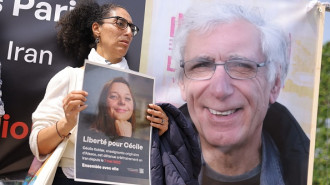UN sets up team to investigate Syria hospital bombings
UN sets up team to investigate Syria hospital bombings
Dozens of hospitals have been destroyed in suspected Russian air raids.
2 min read
Dozens of hospitals and clinics have been struck in air strikes [Getty]
The UN announced on Friday that it will investigate a series of bombings of hospitals in Syria, which had provided their coordinates to avoid being targeted in Russian airstrikes.
UN Secretary General Antonio Guterres announced Friday he is setting up an internal investigation into the strikes on medical centres in opposition areas.
Guterres said in a statement the board would look at "a series of incidents that have occurred in northwest Syria" since the establishment of the so-called "Idlib de-escalation zone" September 2018 by Russia and Turkey.
The committee is not a "criminal investigation" but aimed to "establish the facts for the secretary general", his spokesman Stephane Dujarric said.
Nigerian General Chikadibia Obiakor will head the team and will start work on 30 September, but no deadline was given for it to submit its findings.
Dozens of clinics and hospitals have been damaged or destroyed in suspected Russian bombing this year, despite the medical centres being shared with the UN and then passed on to Moscow.
Human Rights Watch urged the new board to "work quickly to attribute attacks on medical facilities and other humanitarian sites in Syria to the forces who committed them" and called on Guterres to publish the findings.
Ten members of the UN Security Council called on Guterres in July to establish an investigative body, although Russia rejected this panel, diplomatic sources said.
UK ambassador to the UN Karen Pierce welcomed the establishment of the investigative committee.
"Developments in Hama and Idlib governorates in northwest Syria show a repeat of the military tactics deployed by Syrian forces in the taking of Aleppo city and eastern Ghouta," she warned.
Diplomatic sources said that while Russia is taking part in the discussions on a ceasefire for Idlib, but appears unwilling to submit to an official one.
Russia is also seeking to insert clauses in the text excluding "anti-terrorist" operations from any ceasefire deal, something western countries oppose, the same sources said.
Schools in Idlib have also been targeted in suspected Russian airstrikes.
The White Helmets has documented 58 attacks on schools and educational facilities since 26 April.
UN Secretary General Antonio Guterres announced Friday he is setting up an internal investigation into the strikes on medical centres in opposition areas.
Guterres said in a statement the board would look at "a series of incidents that have occurred in northwest Syria" since the establishment of the so-called "Idlib de-escalation zone" September 2018 by Russia and Turkey.
The committee is not a "criminal investigation" but aimed to "establish the facts for the secretary general", his spokesman Stephane Dujarric said.
Nigerian General Chikadibia Obiakor will head the team and will start work on 30 September, but no deadline was given for it to submit its findings.
Dozens of clinics and hospitals have been damaged or destroyed in suspected Russian bombing this year, despite the medical centres being shared with the UN and then passed on to Moscow.
Human Rights Watch urged the new board to "work quickly to attribute attacks on medical facilities and other humanitarian sites in Syria to the forces who committed them" and called on Guterres to publish the findings.
Ten members of the UN Security Council called on Guterres in July to establish an investigative body, although Russia rejected this panel, diplomatic sources said.
UK ambassador to the UN Karen Pierce welcomed the establishment of the investigative committee.
"Developments in Hama and Idlib governorates in northwest Syria show a repeat of the military tactics deployed by Syrian forces in the taking of Aleppo city and eastern Ghouta," she warned.
Diplomatic sources said that while Russia is taking part in the discussions on a ceasefire for Idlib, but appears unwilling to submit to an official one.
Russia is also seeking to insert clauses in the text excluding "anti-terrorist" operations from any ceasefire deal, something western countries oppose, the same sources said.
Schools in Idlib have also been targeted in suspected Russian airstrikes.
The White Helmets has documented 58 attacks on schools and educational facilities since 26 April.





 Follow the Middle East's top stories in English at The New Arab on Google News
Follow the Middle East's top stories in English at The New Arab on Google News

![The law could be enforced against teachers without prior notice [Getty]](/sites/default/files/styles/image_330x185/public/2178740715.jpeg?h=a5f2f23a&itok=xMdFOAIF)
